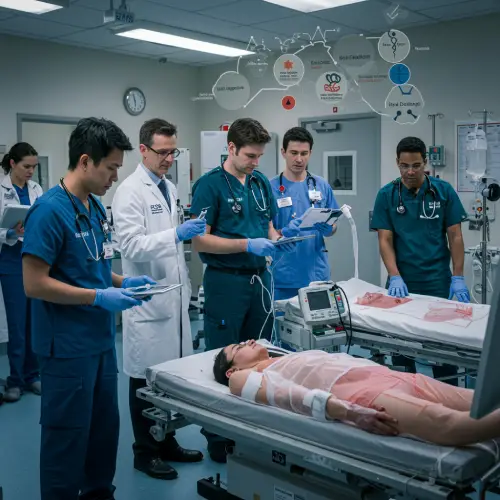Emergency medicine is a fast-evolving field that requires quick thinking, precise decision-making, and the ability to adapt to ever-changing patient needs. One of the most critical ways to ensure high-quality care in emergency departments across the UK is through the development and implementation of national guidelines. These guidelines standardize care practices, reduce variations in clinical decisions, and ultimately improve patient outcomes.
In the UK, the Royal College of Emergency Medicine (RCEM) plays a pivotal role in shaping these national emergency medicine guidelines. With a commitment to promoting the best practices and advancing the specialty, RCEM has established itself as a key force in influencing policy and clinical standards within emergency medicine.
In this blog, we’ll explore the essential role RCEM plays in the creation and evolution of national emergency medicine guidelines and how these contributions directly impact the quality of care delivered in emergency departments across the country.
1. Defining National Standards for Emergency Care
RCEM’s primary goal is to improve the quality of emergency care for patients. A significant aspect of achieving this goal is through the establishment of clinical standards and guidelines that can be applied universally across emergency departments (EDs). By setting national standards, RCEM ensures that every patient, regardless of where they seek care, receives the same high-quality treatment.
The College’s guidelines cover a wide range of clinical topics, from managing common emergencies such as heart attacks and strokes to more specialized areas like pediatric emergencies and trauma care. These guidelines are designed based on the best available evidence and clinical research, ensuring that emergency medicine practitioners have clear, evidence-based instructions for treating their patients.
RCEM’s Clinical Standards provide a framework for EDs, helping to guide their decision-making, treatment protocols, and patient management strategies. These standards are updated regularly to incorporate the latest research findings and best practices in the field.
2. Influencing National Health Policies
RCEM’s influence extends beyond clinical guidelines to the broader scope of national health policies related to emergency care. The College has a voice in shaping how emergency medicine is integrated into the national healthcare system, often working closely with the NHS, government agencies, and other healthcare bodies.
Through advocacy and policy discussions, RCEM pushes for resources, funding, and improvements in emergency care infrastructure. The College advocates for issues such as:
- Increased funding for emergency services to address growing patient volumes.
- Adequate staffing levels to prevent burnout and ensure quality care.
- Integration of technology for faster diagnostics and better patient management.
RCEM’s involvement in these discussions helps shape policies that directly affect the way emergency services operate across the country, making them more efficient and effective in meeting the needs of the public.
3. Creating Evidence-Based Guidelines Through Research and Collaboration
RCEM’s commitment to evidence-based practice is central to the creation of national emergency medicine guidelines. The College supports and facilitates research initiatives aimed at advancing knowledge in emergency care. By conducting or endorsing research, RCEM ensures that the guidelines it develops are rooted in the most up-to-date scientific evidence.
Furthermore, RCEM often collaborates with other professional bodies, healthcare providers, and research institutions to ensure that guidelines reflect a wide range of expert opinions and perspectives. This collaboration is vital for creating comprehensive, practical guidelines that can be applied across diverse clinical settings.
Through the creation of the Emergency Medicine Journal (EMJ), RCEM also provides a platform for the latest research in emergency care, further enhancing its ability to develop guidelines that are based on the most recent findings in the field.
4. Regular Review and Updating of Guidelines
One of the key responsibilities of RCEM is to ensure that its guidelines are always current and reflect the latest clinical practices and emerging trends in emergency medicine. The field is constantly evolving—new treatments, technologies, and research findings are always on the horizon—and RCEM recognizes the importance of staying at the forefront of these changes.
By regularly reviewing and updating national guidelines, RCEM ensures that emergency care professionals have access to the most relevant, up-to-date information when making clinical decisions. These updates help to address new challenges that emerge in emergency care, whether due to changing patient demographics, emerging diseases, or technological advancements.
For example, in the wake of the COVID-19 pandemic, RCEM played a critical role in adapting its guidelines to account for the rapidly evolving situation, including changes to infection control protocols, management of COVID-positive patients, and the triage of patients in overcrowded emergency departments.
5. Providing Educational Resources and Training
Once RCEM develops national guidelines, it works to ensure that all emergency medicine professionals are well-versed in them. This is where RCEM’s role in providing educational resources and training becomes crucial. RCEM offers a range of courses, workshops, and conferences aimed at updating healthcare professionals on new guidelines and clinical practices.
By providing targeted training, RCEM ensures that emergency medicine professionals are not only familiar with the guidelines but also understand how to implement them effectively in their daily practice. This educational aspect is critical in ensuring that guidelines are adopted consistently across the healthcare system.
6. Addressing New and Emerging Challenges in Emergency Medicine
As the healthcare landscape changes, new challenges and issues arise that require the development of new or revised guidelines. RCEM is proactive in addressing these challenges by developing guidelines that respond to emerging health crises, new medical advancements, and changing patient needs.
For instance, guidelines surrounding mental health crises, pre-hospital care, and emergency medical services (EMS) have become more prominent as the understanding of these areas deepens. RCEM has worked to ensure that emergency departments are prepared to manage patients presenting with mental health emergencies and provide appropriate care in a compassionate and effective manner.
Similarly, RCEM’s influence extends to setting guidelines for digital health and telemedicine in emergency settings. With the rise of virtual consultations and remote monitoring, RCEM ensures that emergency medicine professionals are equipped with the knowledge and tools necessary to provide high-quality care using these technologies.
7. Collaborative Approach to Multidisciplinary Care
Finally, RCEM recognizes that emergency medicine often requires a multidisciplinary approach, involving collaboration with professionals from a wide range of specialties. As part of its commitment to comprehensive care, RCEM works with other medical bodies and organizations to develop guidelines that promote interdisciplinary collaboration.
RCEM plays a key role in advocating for teamwork between emergency department clinicians, general practitioners, surgeons, pediatricians, and other specialists to ensure that patients receive the best care possible, especially in complex or multi-faceted cases.
Conclusion
The Royal College of Emergency Medicine plays an instrumental role in shaping the national emergency medicine guidelines that define how care is delivered across the UK. Through its evidence-based approach, advocacy for resources, and commitment to continuous professional development, RCEM ensures that emergency care professionals are equipped with the tools, knowledge, and support they need to deliver the best possible outcomes for patients.
By shaping national standards and guidelines, RCEM has a profound impact on the quality of care in emergency departments throughout the country. As the healthcare landscape continues to evolve, RCEM’s leadership in developing and updating these guidelines will remain a cornerstone of the future of emergency medicine in the UK.




